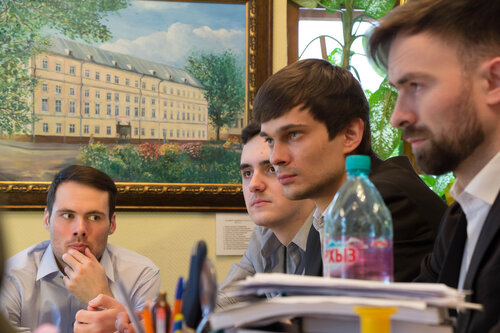–Т–Њ—В —В–∞–Ї–∞—П –Є—Б—В–Њ—А–Є—П.
7 –Љ–∞—А—В–∞ 1960 –≥–Њ–і–∞ –∞–Љ–µ—А–Є–Ї–∞–љ—Б–Ї–Є–є –∞–≤–Є–∞–љ–Њ—Б–µ—Ж —Б–њ–∞—Б 4вАУ—Л—Е —Б–Њ–≤–µ—В—Б–Ї–Є—Е —Б–Њ–ї–і–∞—В (–Ч–Є–≥–∞–љ—И–Є–љ–∞, –Я–Њ–њ–ї–∞–≤—Б–Ї–Њ–≥–Њ, –Ъ—А—О—З–Ї–Њ–≤—Б–Ї–Њ–≥–Њ –Є –§–µ–і–Њ—В–Њ–≤–∞) , 49 –і–љ–µ–є –і—А–µ–є—Д–Њ–≤–∞–≤—И–Є—Е –љ–∞ –±–∞—А–ґ–µ –≤ –Њ–Ї–µ–∞–љ–µ –±–µ–Ј –µ–і—Л –Є –≤–Њ–і—Л. –С–∞—А–ґ—Г –Њ—В–Њ—А–≤–∞–ї–Њ –Њ—В –њ—А–Є—З–∞–ї–∞ –љ–∞ –Ъ—Г—А–Є–ї–∞—Е –Є —Г–љ–µ—Б–ї–Њ –≤ –Њ—В–Ї—А—Л—В—Л–є –Њ–Ї–µ–∞–љ –љ–∞ 2000 —Б –ї–Є—И–љ–Є–Љ –Ї–Є–ї–Њ–Љ–µ—В—А–Њ–≤. –°–ї—Г—З–∞–є —Н—В–Њ—В –Є–Ј–≤–µ—Б—В–љ—Л–є –Є –Њ –љ–µ–Љ –љ–∞–њ–Є—Б–∞–љ–Њ –Љ–љ–Њ–≥–Њ. –°–Њ–≤–µ—В—Б–Ї–Є—Е —Б–Њ–ї–і–∞—В –њ–µ—А–µ–≤–µ–Ј–ї–Є –≤ –°–®–Р, –≥–і–µ –Є—Е –≤—Б—В—А–µ—В–Є–ї–Є —Б –±–Њ–ї—М—И–Є–Љ —Н–љ—В—Г–Ј–Є–∞–Ј–Љ–Њ–Љ –≤–њ–µ—З–∞—В–ї–Є—В–µ–ї—М–љ—Л–µ –∞–Љ–µ—А–Є–Ї–∞–љ—Ж—Л. –Э–Њ —Б–Њ–≤–µ—В—Б–Ї–Є—Е —Б–Њ–ї–і–∞—В –њ—А–Њ—Б—В–Њ —В–∞–Ї –љ–µ –њ—А–Њ–љ—П—В—М –Є –Њ–љ–Є –њ–Њ—Б–ї–µ —Н–Ї—Б–Ї—Г—А—Б–Є–Є –њ–Њ –Р–Љ–µ—А–Є–Ї–µ –≤–µ—А–љ—Г–ї–Є—Б—М –≤ –°–°–°–†. –У–µ—А–Њ—П–Љ–Є. –Э–∞–≤–µ—А–љ–Њ–µ, –љ–µ —Б—В–Њ–ї—М–Ї–Њ –њ–Њ—В–Њ–Љ—Г —З—В–Њ –≤—Л–ґ–Є–ї–Є, –∞ –њ–Њ—В–Њ–Љ—Г, —З—В–Њ –љ–µ –Њ—Б—В–∞–ї–Є—Б—М –≤ –°–®–Р. 49 –і–љ–µ–є —А–µ–±—П—В–∞ –њ—А–Њ–і–µ—А–ґ–∞–ї–Є—Б—М –µ–і–≤–∞-–µ–і–≤–∞. ¬Ђ–Я–Є—Й—Г –њ—А–Є–љ–Є–Љ–∞–ї–Є —А–∞–Ј –≤ –і–≤–∞ –і–љ—П. –Ъ–Њ–≥–і–∞ —Б—К–µ–ї–Є –њ–Њ—Б–ї–µ–і–љ—О—О –Ї–∞—А—В–Њ—И–Є–љ—Г, –≤ —Е–Њ–і –њ–Њ—И–ї–∞ –Ї–Њ–ґ–∞ вАУ —А–µ–Љ–љ–Є, –±–Њ—В–Є–љ–Ї–Є, –≥–∞—А–Љ–Њ—И–Ї–∞. –Ф–∞–ґ–µ –Ї–Є—А–Ј–Њ–≤—Л–µ —Б–∞–њ–Њ–≥–Є –њ—А–Є–≥–Њ–і–Є–ї–Є—Б—М вАУ ¬Ђ–≤–∞—А–Є–ї–Є –Є—Е –≤ –Њ–Ї–µ–∞–љ—Б–Ї–Њ–є –≤–Њ–і–µ, —З—В–Њ–±—Л –≤—Л–≤–∞—А–Є–ї—Б—П –≥—Г—В–∞–ї–Є–љ, –њ–Њ—В–Њ–Љ —А–µ–Ј–∞–ї–Є –љ–∞ –Ї—Г—Б–Њ—З–Ї–Є, –±—А–Њ—Б–∞–ї–Є –≤ –њ–µ—З–Ї—Г, –≥–і–µ –Њ–љ–Є –њ—А–µ–≤—А–∞—Й–∞–ї–Є—Б—М –≤ –љ–µ—З—В–Њ –њ–Њ—Е–Њ–ґ–µ–µ –љ–∞ –і—А–µ–≤–µ—Б–љ—Л–є —Г–≥–Њ–ї—М –Є —Н—В–Њ –µ–ї–ЄвА¶–Ъ—Г—Б–Њ—З–Ї–Є –≤–∞—А–µ–≤–∞ –ґ–µ–≤–∞–ї–Є, –љ–∞–Љ–∞–Ј–∞–≤ –љ–∞ –љ–Є—Е —В–µ—Е–љ–Є—З–µ—Б–Ї–Є–є –≤–∞–Ј–µ–ї–Є–љ...¬ї. –°–Њ–≤–µ—В—Б–Ї–∞—П –њ—А–µ—Б—Б–∞, –Њ–њ–Є—Б—Л–≤–∞—П –≥–µ—А–Њ–Є—З–µ—Б–Ї–Є–є –і—А–µ–є—Д, –Ї–∞–Ї –≤—Б–µ–≥–і–∞ –≤ —В–∞–Ї–Є—Е —Б–ї—Г—З–∞—П—Е –њ–µ—А–µ–≥–Є–±–∞–ї–∞ –њ–∞–ї–Ї—Г —Б –њ–∞—В–µ—В–Є–Ї–Њ–є.
–Р —Б–Њ–≤–µ—В—Б–Ї–∞—П –Љ–Њ–ї–Њ–і–µ–ґ—М, —Г–ї–Њ–≤–Є–≤ –љ–µ—Г–Ї–ї—О–ґ–µ—Б—В—М –њ–µ—А–µ–і–Њ–≤–Є—Ж, –Њ—В—А–µ–∞–≥–Є—А–Њ–≤–∞–ї–∞ –љ–∞ –њ—А–Њ–њ–∞–≥–∞–љ–і—Г, —Б–Њ—З–Є–љ–Є–≤ –Є—А–Њ–љ–Є—З–µ—Б–Ї—Г—О –њ–µ—Б–µ–љ–Ї—Г —Б —В–∞–Ї–Є–Љ–Є —Б–ї–Њ–≤–∞–Љ–Є:
–Ъ–∞–Ї –љ–∞ –Ґ–Є—Е–Њ–Љ –Њ–Ї–µ–∞–љ–µ
–Ґ–Њ–љ–µ—В –±–∞—А–ґ–∞ —Б —З—Г–≤–∞–Ї–∞–Љ–Є,
–І—Г–≤–∞–Ї–Є –љ–µ —Г–љ—Л–≤–∞—О—В вАФ
–Я–Њ–і –≥–∞—А–Љ–Њ—И–Ї—Г —А–Њ–Ї –ї–∞–±–∞—О—В!
–Ч–Є–≥–∞–љ—И–Є–љ-–±—Г–≥, –Ч–Є–≥–∞–љ—И–Є–љ-—А–Њ–Ї,
–Ч–Є–≥–∞–љ—И–Є–љ –њ–µ—А–≤—Л–є —Б—К–µ–ї —Б–∞–њ–Њ–≥...
–Я–Њ–Ї–∞ –Я–Њ–њ–ї–∞–≤—Б–Ї–Є–є –Ј—Г–±—Л —Б–Ї–∞–ї–Є–ї,
–Ч–Є–≥–∞–љ—И–Є–љ —Б—К–µ–ї –µ–≥–Њ —Б–∞–љ–і–∞–ї–Є.
–Ч–Є–≥–∞–љ—И–Є–љ-–±—Г–≥–Є, –Ч–Є–≥–∞–љ—И–Є–љ-—А–Њ–Ї,
–Ч–Є–≥–∞–љ—И–Є–љ —Б—К–µ–ї –≤—В–Њ—А–Њ–є —Б–∞–њ–Њ–≥...
–Ь–Њ—Б–Ї–≤–∞, –Ъ–∞–ї—Г–≥–∞, –Ы–Њ—Б-–Р–љ–ґ–µ–ї–Њ—Б
–Ю–±—М–µ–і–Є–љ–Є–ї–Є—Б—М –≤ –Њ–і–Є–љ –Ї–Њ–ї—Е–Њ–Ј.
–Р –≤–Њ—В —Н—В–Њ –Љ–Њ–є –≤–Њ–ї—М–љ—Л–є –њ–µ—А–µ–≤–Њ–і —Н—В–Њ–є –њ–µ—Б–µ–љ–Ї–Є:
Ziganshin-rock, Ziganshin-boogie
Ziganshin's originally from Kaluga.
Ziganshin-boogie, Ziganshin-rock
Ziganshin ate his boot and sockвА¶
Poplavsky-boogie but rocks he better,
Poplavsky ate his girlfriend's letter.
Moscow, Kaluga, Los AngelOs
Are now united in a single kolkhoz.
–Э–Є–ґ–µ –Ї–∞–і—А—Л —Б–њ–∞—Б–µ–љ–Є—П —Б–Њ–≤–µ—В—Б–Ї–Є—Е —Б–Њ–ї–і–∞—В, —Б–љ—П—В—Л–µ —Б –±–Њ—А—В–∞ –∞–Љ–µ—А–Є–Ї–∞–љ—Б–Ї–Њ–≥–Њ –∞–≤–Є–∞–љ–Њ—Б—Ж–∞ ¬ЂKearsarge¬ї. –°–љ–∞—З–∞–ї–∞ –≤–Є–і–µ–Њ –њ–Њ–Ј–Є—А—Г—О—Й–Є—Е –∞–Љ–µ—А–Є–Ї–∞–љ—Б–Ї–Є—Е –Љ–Њ—А—П—З–Ї–Њ–≤, –∞ –Ї–∞–і—А—Л —Б–њ–∞—Б–µ–љ–Є—П –љ–∞—З–Є–љ–∞—О—В—Б—П —Б 1:35.
–Р –≤–Њ—В –Ї–∞–Ї –њ—А–Њ–Є—Б—Е–Њ–і–Є–ї–Њ —Б–њ–∞—Б–µ–љ–Є–µ:
On March 2 they saw a ship, the first since drifting off to sea. They lit a fire on the deck to signal the ship of their presence, but the ship passed. However, help did arrive on March 7 from the US aircraft carrier Kearsarge, which noticed the barge and approached it.
The Soviet soldiers did not know what to do. They were Soviet citizens and, though they were dying of starvation, they were afraid to receive help from Americans вАУ the Cold War was raging in 1960. Later in an interview, Ziganshin confessed that he had been less frightened of death than of American help.
They thought that Kearsarge would give them food and fuel then leave, but they were instead invited on board the aircraft carrier. The crew gave them soup and bread and found a translator to speak with them. Moscow was informed about the soldiers immediately, but remained silent for several days. The Soviet government was debating whether the four should be treated as heroes or traitors.
In a week, the Americans hosted a press conference on board the Kearsarge. Though Soviet reporters were not allowed to participate, one of them, Boris Strelnikov, called to say everything was all right and the soldiers have nothing to worry about. The press conference was over in less then an hour вАУ though Ziganshin had a nosebleed because of the stress.
One of the reporters asked the soldiers if they wanted to stay in the USA. He said he could help with it, but they refused the offer. They wanted to go home.





